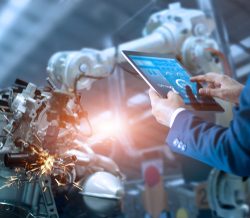 What Does The Future Of Machining Look Like?
What Does The Future Of Machining Look Like?
For the last few decades, machining has made steady progress. Controllers are easier to use, tools and software are better suited for their tasks, and machines are faster and more accurate than ever before. Now, the industry is making huge strides to bring manufacturing into the hands of consumers – and that’s great news! But it also means that we’re going to need more skilled workers.
Artificial Intelligence (AI)
Artificial Intelligence (AI) is a term that refers to machine learning, which is the process of creating algorithms that help machines learn from data. AI can be applied to a variety of industries, but it has particularly significant potential in the manufacturing industry. One example of AI in manufacturing is CNC machining, which uses interchangeable tools to perform cutting, grinding, drilling, and lathing tasks. In CNC machining, an AI-powered software program can automatically adjust the settings of the machine to maintain consistent quality. Another area where AI can be useful is in predictive maintenance. By collecting data from production machinery, engineers can create models that learn and improve with experience. This is especially true for equipment that is designed to handle hard materials, like carbon fiber. With AI, it is possible to predict when tools will wear out, which allows for the right tool replacement at the best time. This can save manufacturers money, and increase efficiency in their operations.
Machines That Make Machines
In the manufacturing industry, there are hundreds of different types of machine tools. Some of the most common are milling machines, lathes and EDM machines. Many of these machines are now run by preplanned computer programs, but most still rely on the experience and precision of human operators to ensure they are running correctly. Engineers are now working to develop a smart machine that could help program itself and trim manufacturing costs. It would do this by using software and hardware to monitor itself, and convey vital information to an operator or process planner.
Smarter Shops
Getting from raw material to end product requires a number of production processes that must be done right. The machining industry is no exception to this rule and machine shops are looking to smarter technologies to reduce setup and cycle times, improve safety and increase efficiency. One way to improve process efficiencies is by incorporating more software into the equation. More capable and intuitive enterprise resource planning (ERP) software, for example, helps machine shops boost their overall efficiencies and pass on savings to customers. Another way is through smarter shop management systems that automate key parts of the process. For instance, digital tool libraries make it easy for machinists to download part programs and tool offset data. Researchers are also working on process and structural dynamics simulation models that can be used by a process planner to show how a machine will work under certain conditions before it runs. That can help a CAM programer create the best cutting strategy for a given part.
More Accessible Manufacturing
Increasingly, technology is altering the way manufacturers do business. These new processes are bringing more accessibility and flexibility to production operations, as well as a host of benefits including improved machining accuracy, reduced setup times and enhanced safety levels. Putting it all together, however, is challenging. It requires integrating all of the disparate aspects that make up a smart machine, including predictive models and hardware. To tackle these challenges, the Smart Machining Platform Initiative was launched five years ago by a number of machine-tool manufacturers, commercial software developers and researchers. The organization serves as a catalyst to bring different technologies into a smart-machining whole.
Escofab Inc.
Escofab Inc. is one of the few CNC machining suppliers with a full-service engineering team on-site, and it has a broad range of industry expertise in the areas of additive, subtractive and programmable machining, as well as sheet metal fabrication. We can help you navigate the complexities of any project, from simple hobby-scale projects to complex, high-volume applications. So, if you have any further questions, please feel free to contact us anytime!
